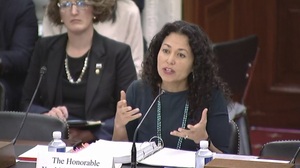Senate Ag Committee holds hearing on Farm Bill energy programs
Energy Disrupter
ADVERTISEMENT
The U.S. Senate Committee on Agriculture, Nutrition and Forestry on Nov. 15 continued its work to develop the 2023 Farm Bill with a hearing focused on rural development and energy programs. The Higher Blends Infrastructure Incentive Program, BioPreferred Program, Rural Energy for America Program, and USDA’s 9003 loan guarantee program were among the topics discussed during the event.
The hearing’s first panel featured USDA Under Secretary for Rural Development Xochitl Torres Small. Sen. Debbie Stabenow, D-Mich., asked Small to discuss actions the agency is taking to improve the BioPreferred Program, which aims to increase the purchase and use of biobased products.
“You know the power of more and better markets and how supporting the bioeconomy both in terms of biobased fuel, but also biobased products can also be crucial,” Small said. “Rural Development has an opportunity to make sure that when there is federal procurement, they are reporting when its biobased and that we are keeping good statistics on that so we have benchmarks to grow.” Small also discussed the importance of educating members of biobased industry on the benefits of participating in the program. Small said the program can be improved by working with the Census Bureau to implement NAICS codes that would allow more accurate tracing of biobased products.
Regarding HBIIP, Small noted that USDA is working to incorporate funds allocated to the program as quickly as possible. She said recent listening sessions held by the agency to gather input on HBIIP and other USDA programs that received funding through the Inflation Reduction Act were attended by more than 850 stakeholders. According to Small, listening sessions like these help the USDA tailor programs to local ideas and visions, making them more effective in supporting rural America.
Sen. Amy Klobuchar, D-Minn., also questioned Small on the HBIIP program and the importance of investing in biofuel infrastructure. Small said the expansion of the HBIIP program is helping to ensure that higher blends of biofuels can be distributed across the country. She also said the USDA is excited about the increased investment in the BioPreferred Program, noting that an integral part of building the biobased economy is the ability to turn waste material into useful products, including chemicals, advanced biofuels, or foam used to build cars.
Sen. Joni Ernst, R-Iowa, addressed the strong demand for the REAP program. “It’s my understanding that REAP is overwhelmingly oversubscribed,” Small said, explaining that the agency lacks sufficient funding to fulfill demand for the program.
The hearing also included a second panel, made up of stakeholders advocating in support of expanded Farm Bill programs, including Christophe Schilling, founder and CEO of Geno, a company that has developed a wide range of biobased products. One technology developed by the Geno enables the production of biobased 1,4-butandeiol (bio-BDO). He referred a project under way in Iowa that is being developed in partnership with Qore, a joint venture between Cargill and Helm. Qore has constructed the world’s largest bio-BDO facility powered by Geno, a $300 million capital investment.
“We view the programs within the energy title of the Farm Bill as providing a critical path to translating U.S.-based innovations into leadership in the manufacturing of value-added products from our abundant agricultural feedstocks,” Schilling said.
During his testimony, Schilling outlined several ways the committee can improve the both the BioPreferred Program and the USDA’s 9003 loan guarantee program.
He called on the committee to reenergize the BioPreferred Program by recommitting to the mandatory purchasing requirements for federal agencies and their contractors. Schilling also said the program should set yearly requirements to define what percentage of government procurement must contain BioPreferred products so that progress can be tracked year over year. In addition, he urged the committee to expand the program to consider the entire supply chain, and reenergize stalled efforts to develop NAICS codes for renewable chemical manufacturers and producers of biobased products. Without dedicated NAICS codes, he said federal agencies cannot accurately classify, collect data or report on the growing biobased economy. Finally, he said the USDA should further invest in efforts to educate the public about the benefits of being BioPreferred certified.
Regarding the 9003 loan guarantee program, Schilling called on the committee to consider removing the funding cap for the program, currently set at $250 million per project. He said removal of the cap is necessary given current record inflation and the modern costs of construction. He also urged the USDA to streamline the program so that it moves at the pace of business. Currently, the review process can take up to 18 months to complete. For companies that face market pressures to deliver quickly and at scale, Schilling said this timeframe is too long and deters qualified applicants.
A full replay of the hearing is available on the Senate Ag Committee website.
















